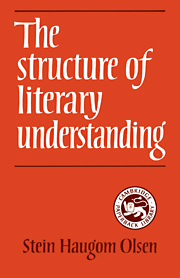Book contents
2 - LITERATURE AND EMOTION
Published online by Cambridge University Press: 30 September 2009
Summary
Introduction
In recent literary theory the conflict between extensional and intentional theories has been held to be a basic issue conclusive for the sort of comments on literary works to be considered relevant, and thus constituting criticism. This view of the conflict is reinforced by a set of contrasts which are assumed to coincide with the extension/intention distinction. Extensional theories are associated with a strong version of the view that critical judgements are objective. The literary work is an objectively given ‘thing’ which can be observed by anybody with the necessary interest and requisite foreknowledge; and judgements about this object are verifiable in accordance with certain generally accepted procedures. According to extensional theories there is no need to refer to occult qualities in the producer's or receiver's mind (for instance, the producer's intention) when making a critical judgement. Intentional theories, on the other hand, are often taken to imply critical subjectivism. If judgements about literary works involve reference to occult qualities in the reader's mind – qualities primarily accessible to that person and only indirectly to others – then, depending on whether one refers to the producer's or the receiver's response, either one is led to 'a confusion between the poem and its origins, a special case of what is known to philosophers as the Genetic Fallacy’ and consequently one ends in ‘biography and relativism’ or one is led to ‘a confusion between the poem and its results(what it is and what it does), a special case of epistemological skepticism’ and one ends in ‘impressionism and relativism’. This version both of the conflict in literary theory and the intentional theory does, of course, originate with the supporters of extensional theories.
- Type
- Chapter
- Information
- The Structure of Literary Understanding , pp. 24 - 45Publisher: Cambridge University PressPrint publication year: 1978



